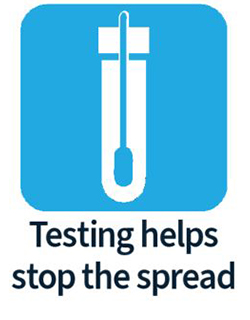NYS Documentation of Isolation Orders Affirmation of Isolation for adults and children who have tested positive for COVID-19 and have been in isolation consistent with NYSDOH guidance. Click here for a fill-in PDF form.
This page is no longer being updated, effective 9/4/2024.
 On This Page
On This Page
- When to get tested
- PCR (lab confirmed) testing
- Self- or at-home testing intro and process
- Where to get testing kits
- Resources
When to get tested
You have symptoms:
If you, or someone you're with develops any of the symptoms common for COVID-19, you should get tested for the virus that causes COVID-19 regardless of your vaccination status. These include, but are not limited to the following:
- Fever or chills
- Cough or difficulty breathing
- Fatigue
- Muscle or body aches
- Headache
- New loss of taste or smell
- Congestion or runny nose or sore throat
- Nausea, vomiting or diarrhea
Other reasons to get tested:
- Close contact exposure: If in the last 2 weeks, you have been exposed to someone who has tested positive for, or recently had COVID-19, get tested.
- Upcoming medical procedure: Follow your provider's instructions for when to schedule your test prior to having your procedure.
Learn more:
- Call your healthcare provider.
- If you do not have a healthcare provider, or need assistance with obtaining health insurance, please call 2-1-1 (607-273-8686) for assistance.
- Visit these websites: NYS Department of Health or the CDC's Testing page.
PCR Testing
The Cayuga Health (CH) Sampling Site at the Shops at Ithaca Mall (40 Catherwood Rd) closed on Friday, May 5, 2023, following a multi-month review of notable decline of its use. Cayuga Health continues to offer the public PCR (lab confirmed) testing at physician offices, including walk-in visits at Immediate Care (8 Brentwood Drive, Ithaca). PCR testing continues to be available at other healthcare providers in the community as well. Read our April 28, 2023 press release for additional information.
Low or No-Cost PCR tests at select local pharmacies: Click here for locations. Contact the pharmacy directly for more information.
Rheonix Laboratories (30 Brown Road, Ithaca): Nasal or Saliva testing; insurance billed. Click here for more information or call 607-252-6424.
Changes in funding for PCR testing: The Federal Emergency Declaration funding ends on May 11, 2023 and PCR test funding by the Tompkins County Legislature ended in January 2023. These changes may result in changes to your health insurance coverage for PCR or lab confirmed tests, such as responsibility for co-pays. It is recommended that you speak with your workplace HR or benefits office, or your insurance provider to find out the cost prior to seeking a PCR test. Health insurance coverage requires that the situation fit the criteria for being medically necessary.
Self- or At-Home Testing Kits
WHAT: Self-tests or at-home test kits (also sometimes referred to as Antigen tests) are one of the many prevention tools we can use to stop of the spread of COVID-19, along with vaccination, masking, and physical distancing. They are able to signal current infection using a qualitative detection of the nucleocapsid protein antigen from SARS-CoV-2, providing information about the risk of spreading the virus that causes COVID-19. Typically a nasal swab is used to collect the sample.
WHERE: Self-test kits are available over the counter at many pharmacies and online — no prescription needed. Note that the County no longer has free self-test kits, effective 4/4/2024. The County had been delivering test kits provided by NYS for free distribution by local libraries and other municipal centers, subject to availability. Click here for more information.
When you use a self-test follow the product instructions exactly to minimize false or invalid results. Download a self-test check list (PDF).
Who should use self-test kits?
- Self-tests are recommended for individuals who do not have symptoms, and are seeking quick results to identify infection or increase confidence that you are not positive for COVID-19.
- A self-test can be used as a prevention measure before gathering indoors with others who are not in your household. This is especially important before gathering with individuals who are unvaccinated, older individuals, those who are immunocompromised, or individuals at greater risk of severe disease.
- If you are symptomatic or a close contact, it is recommended to take a PCR test. While self-tests may be used if you have COVID-19 symptoms or have been exposed or potentially exposed to an individual with COVID-19, they are not as conclusive as the PCR test. Contact your healthcare provider to further discuss symptoms or if you are seeking medical care.
How to use the self-test
- Prepare to take the test by reading and following the manufacturer’s instructions exactly to minimize false or invalid results. Wash hands with soap and water and thoroughly clean surfaces where you’ll take the test. Be sure to know what the results will look like on your brand of test.
- Collect your sample by following the instructions exactly. Most self-tests take nasal samples, which require you to swab the inside of your nose for fifteen (15) seconds for each nostril.
- Once collected, use the sample exactly as described in the instructions to complete the self-test.
- Be sure to monitor the timeframe for the reading the test, usually wait 10 minutes and no more than 15 minutes. Some of the test kits refer you to a phone app that leads you through the process and sets a timer for reading the results.
If your self-test result is positive
- You should immediately isolate for 5 days from the positive test result or the onset of symptoms, whichever occurs first. Continue to wear a well-fitting mask around others for an additional 5 days following isolation.
- A follow-up PCR test is not necessary. Once you receive a positive test result, regardless of the type of test, you are considered a positive case and should isolate from others.
Notify close contacts
- Anyone in your household (who you live with) is at increased risk of infection, especially with the more transmissible Omicron variant. Everyone in the household should monitor themselves closely for symptoms, especially if they are unvaccinated, immuno-compromised, or have other underlying health conditions. They may contact their healthcare practitioner about any concerns and additional treatment.
- Please inform close contacts that they may have been exposed. A close contact is defined as someone who was within 6 feet of an infected person for a cumulative total of 15 minutes or more over a 24-hour period during the infectious period.
- The infectious period goes from 2 days before you first had symptoms (if you have symptoms).
- If you do not have symptoms (are asymptomatic), the infectious period starts 2 days prior to test specimen collection.
- Close contacts should monitor themselves closely for symptoms. If symptoms develop self test or seek a PCR test.
- If you are experiencing any of the emergency warning signs of trouble breathing, persistent pain or pressure in the chest, bluish lips or face, call 9-1-1 immediately.
Over-the-counter (OTC) test kits.
- Before You Throw Out "Expired" Tests, check FDA's website to see if your COVID-19 tests' expiration dates have been extended..
- A negative result indicates that you may not be infected and may be at low risk of spreading disease to others, though it does not rule out an infection. You may be infected but your "viral load" may not be high enough for the test to pick it up. Also, occasionally a test gives a false negative.
- Consider repeating the test 24 hours later, especially if you are feeling symptons of COVID-19 or the flu. Test kits frequently include two tests and retesting will increase the confidence of your result.
Documentation of isolation orders
for third parties, including work or school
Case investigations have ceased for most positive cases age 18-64 years old, and individuals do not get a phone call and isolation order from a case investigator. Instead, follow-up for a positive lab-certified PCR test is by email or SMS text message. The document listed below is valid proof to present to your employer or school that you or your dependent have been ordered into isolation (you tested positive).
NYSDOH documentation following a positive lab-certified test
- NYSDOH self-Affirmation of Isolation form
- If you develop symptoms or symptoms worsen, contact your healthcare practitioner and seek additional care.
Resources
Learn more about self-tests
- U.S. Department of Health and Human Services (HHS)
- Order free tests, delivered to your home by USPS.
- Testing resources.
- Take a test.
- CDC website's Self-Testing page.
- FDA website's Testing Basics page.
- A list of all OTC products with an FDA Emergency Use Authorization (EUA) is here.
This page last reviewed on April 5, 2024.

